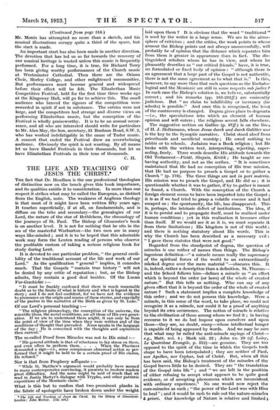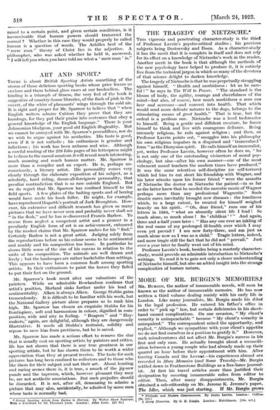THE LIFE AND TEACHING OF JESUS THE CHRIST.*
Tan fact that Dr. Headlam is the one professional theologian of distinction now on the bench gives this book importance, and its qualities entitle it to consideration. In more than one
respect it strikes what may be called the European, as distinct from the English, note. The weakness of Anglican theology is that most of it might have been written fifty years ago.
It touches superficially, if at all, on fundamentals, and is diffuse on the trite and secondary—the genealogies of our Lord, the nature of the star of Bethlehem, the chronology of the journeys of St. Paul. The Bishop of Gloucester's book is on another level. It is not for nothing that he sits in the see of the masterful Warburton—the two men are in many ways like-minded ; and it is to be hoped that this admirable work may form the Lenten reading of persons who observe the profitable custom of taking a serious religious book for study during Lent.
It is devoted to one particular problem, " the general credi- bility of the traditional account of the life and work of our Lord." As the qualification " general " implies, it concedes much. That the Gospels " contain true history " will not be denied by any critic of reputation ; but, as the Bishop admits, they contain a good deal besides. Of the Lucan
Vor-Geschichte - " It must be frankly confessed that there is much reasonable doubt as to the limits of what is history and what is legend in the story ; and I do not feel confident, for we have not the evidence to pronounce on the origin and source of these stories, and especially of the psalms in the narrative of the Birth as given by St. Luke."
Of our Lord's personal teaching :-
" The religious phraseology, the conception of the universe, the scientific ideas, the social conditions, are all those of His own gener- ation. If we are to understand them aright, it can only be from the point of view of the time when they were written and of the conditions of thought that prevailed. Jesus speaks in the language of the day ; He is concerned with the thoughts and aspirations then current."
The so-called Proof from Miracles was not to His mind :-
" His general attitude is that of reluctance to lay stress on them, and even often to perform them. . . . When the Pharisees demanded a sign—i.e., some conspicuous abnormal action so per- formed that it might be held to be a certain proof of His claims, He refused."
Nor is that from Prophecy adequate :-
"While St. Matthew's argument would probably have seemed to many contemporaries convincing, it presents to modern readers great difficulties. And the same might be said of much that we read in Justin Martyr's dialogue with Trypho, and other patristic expositions of the Messianic claim."
What is this but to confess that two prominent planks in the fabric of apologetic have broken down under the weight • The Life and Teaching of Jame Lie MU. By the Bishop of ..Glonoester. London: John Murray. [125. net] laid upon them ? It is obvious that the word " traditional " is used by the writer in a large sense. We are in the atmo- sphere of criticism ; and the critics, the weak points in whose armour the Bishop points out not always unsuccessfully, will probably be of opinion that the distance which separates him from them is greater in appearance than in fact. The dis- tinguished scholars whom he has in view, and whom he pleasantly describes as " our critical friends," have, it is true, no formulated or fixed body of opinion : " although there is an agreement that a large part of the Gospel is not authentic, there is not the same agreement as to what that is." Is this, however, to say more than that such questions as the Eschato- logical and the Messianic are still in some respects sub judice ? In each case the Bishop's solution is, we believe, substantially correct ; and his remarks (pp. 165-292ff.) are eminently judicious. But " no claim to infallibility or inerrancy (he admits) is possible." And once this is recognized, the level of the controversy is changed. Dogma gives place to dogmata —i.e., the speculations into which an element of human opinion and will enters ; the religious accent falls elsewhere.
The suggestive section on Galilee (p. 97ff.) is on the lines of H. J. Holtzmann, whose Jesus durch and durch Galilder war is the key to the Synoptic narrative. Christ stood aloof from priesthoods and sacrificial worship ; He owed nothing to rabbis or to schools. Judaism was a Book religion ; but He broke with the written text, interpreting, rejecting, super- seding, freely. Three words describe His attitude towards the Old Testament—Pietat, Skepsis, Kritik ; He taught as one having authority, and not as the scribes. " It is sometimes maintained that He had no conception of His true mission, that He had no purpose to preach a Gospel or to gather a Church" (p. 176). The three, things are not in pars materia. His mission was to preach the Gospel, and He did so ; it is questionable whether it was to gather, if by to gather is meant to found, a Church. With the conception of the Church a foreign element seems to have been imported into the Gospel ; it is as if we had tried to grasp a volatile essence and it had escaped us ; the spontaneity, the life, has disappeared. This is, perhaps, the intrinsic defect of institutions. The idea, if it is to persist and to propagate itself, must be realized under human conditions ; yet in this realization it becomes other than itself. If we would see it as it is, we must separate it from these limitations ; His kingdom is not of this world ; and there is nothing statutory about His words. This is why the Church has been described as a necessary evil : " I gave them statutes that were not good."
Regarded from the standpoint of dogma, the question of miracles is one rather of names than things. The Bishop's ingenious definition—" a miracle means really the supremacy of the spiritual forces of the world to an extraordinarily marked degree over the mere material "—obscures this. It is, indeed, rather a description than a definition. St. Thomas— and the School follows him—defines a miracle as " an effect which is beyond the order (or Jaws) of the whole of created nature." But this tells us nothing. Who can say of any given effect that it is beyond the order of the whole of created nature ? Such a statement implies a complete knowledge of this order ; and we do not possess this knowledge. Were a miracle, in this sense of the word, to take place, we could not recognize it as a miracle, nor could it be a proof of anything beyond its own occurrence. The notion of miracle is relative to the civilization of those among whom we find it ; in having recourse to it we do but impose upon ourselves and upon those—they are, no doubt, many—whose intellectual hunger is capable of being appeased by words. And we may be sure that what may be vaned the anti-miracle sayings of Christ- e.g., Matt. xvi. 4 ; Mark xiii. 22 ; John xx. 29 (cf. Loisy, Le Quatrieme Evangile, p. 512)—are genuine. They are too opposed to the spirit of the time in Which the Gospels took shape to have been interpolated ; they are neither of Paul, nor Apollos, nor Cephas, but of Christ. But, when all this has been said, the Bishop's treatment of the miracles of the Gospel leaves little to be desired. They are " the translation of the Gospel into life " ; and " we are left in the position of either refusing to accept what appears to be quite good evidence, or of accepting phenomena which are inconsistent with ordinary experience." No one would now reject the cure-miracles as such ; " the power of the Lord was with Him to heal " ; and it would be rash to rule out the nature-miracles a priori. Our knowledge of Nature is relative and limited ;
raised to a certain point, and given certain conditions, is it inconceivable that human powers should transcend the normal ? Whether in this case they would properly be called human is a question of words. The Achilles heel of the " mere man " theory of Christ lies in the adjective. A philosopher, who was asked whether he held it, answered, " I will tell you when you have told me what a ' mere man ' is."



































































 Previous page
Previous page